How AI SEO and PR Intersect: What LLMs Like Gemini and ChatGPT Are Really Using to Rank Brands
What we did
AI SEO is going to be the next big focus for the search world.
We wanted to find out the correlation between non-branded search queries in LLMs and the sources they used to decide which brands to show in their results. Specifically, whether earned media was used and what type of earned media was being used as a source to decide which brands to show.
Summary of what we found
- Earned media was used as a source for 99% of search queries across Gemini and ChatGPT
- Industry media (relevant to the query) was used as a source for 60% of queries in Gemini
- ‘Best of lists’ were used as a source for 42% of queries in Gemini
- National media was only used as a source 6% of the time in ChatGPT and 30% of the time in Gemini
- Nearly 50% of media sources used in Gemini were from 2024 onwards, and 40% of sources in ChatGPT were from 2024 onwards.
How we did it
We used a simple process.
Stage 1)
We pulled 50 stereotypically high volume non-branded search queries in Google across the e-commerce landscape, e.g. watches
We then added 2 sets of terms under the generic query.
The first query was a brand query, e.g. ‘Watch brands’. The second query was a price-based search, e.g. ‘watches under £250’
In total, we analysed 100 queries across various e-commerce verticals using those two types of queries.
We did this across ChatGPT and Gemini
Stage 2)
After the initial query, the LLMS were asked two follow-up questions
The first was a question around which sources it used and if it used earned media and publishers. The second was requesting the links to the publications/articles and the dates of when they were published
Stage 3)
An analysis and segmentation of the data.
We recorded responses and segmented publisher sources into different sections, such as
- Industry publishers (Media related to that search query and industry)
- Nationals
- Best of lists
- Social
EARNED MEDIA WAS USED AS A SOURCE 99% OF THE TIME FOR NON BRANDED SEARCHES IN LLMS
Earned media was used 99% of the time. This is a pretty big stat for the PR industry. It’s a pretty big stat for the spot between the SEO and the PR industry.

Similar to being able to rank in Google for a non-branded term, there are multiple factors that Google takes into consideration when deciding whether your website should rank highly for that query or not. This is going to be a similar process for LLMs. Brand reputation, customer reviews and your brand’s relevance to that category are all going to play a part, but it looks like earned media is going to be the key in the LLMS deciphering all of those things by analysing your brand’s media coverage.
LLMs are trained on vast amounts of data provided by certain media and websites. This data will continue to grow as more partnerships are formed. At the same time, the LLMs were pulling information from relevant media sources online that it may or may not have been trained on already.
What does this mean?
We’ll say it again. Earned media was used as a source in 99% of the non-branded searches we carried out. That’s across both Gemini and ChatGPT.
Get your Search teams in a room with your PR teams and talk.
WHAT TYPE OF PUBLICATIONS WERE USED AS SOURCE?
This part was always going to be interesting. We suspected that earned media was going to be important and appear as a source in a high % of responses but we wanted to know what type of earned media was involved.
RELEVANCE: INDUSTRY PUBLICATIONS WERE USED AS A SOURCE IN GEMINI FOR NEARLY 60% OF SEARCHES
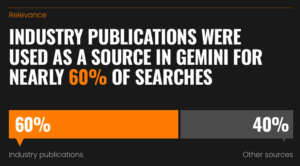
We defined industry publications as publications that were highly relevant to that search query. E.g. Running trainer brands with a source of runnersworld.com
Relevance of earned media has always been a huge part in ranking in Google, and it looks like it’s going to be vital when appearing in LLMs.
How does this compare between the two LLMs we used?
Gemini used industry publications as a source 59% of the time. ChatGPT used industry publications 43% of the time as a source. So, there was a slight difference here between the models and types of sources.
Percentage Use of Industry Media as a Source in LLM Outputs
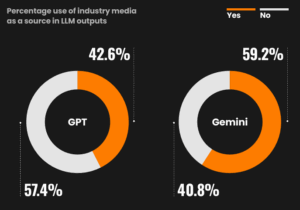
What does this mean?
Contextual relevance of the media you are earning coverage from is going to be so important when appearing for non branded searches in LLMs.
It’s going to be important when users are using LLMs but it’s also going to be important when users are getting their own AI assistants (this will happen and it will happen fast) to navigate the messy middle for them and recommend brands. How will these LLMS decide which brands to show? Analysing information from relevant media will be a key part of the process.
‘BEST OF’ LISTS WERE USED AS A SOURCE FOR 42% OF SEARCHES IN GEMINI
We purposefully didn’t include any ‘best’ search queries as we wanted to see if LLMs naturally leant towards ‘best’ lists without being prompted
Some sources ticked 2 boxes in that the source was from relevant media but also the type of media was a ‘best of list’ e.g. ‘best running trainers 2024’
The prevalence of “best of” lists as sources in LLM outputs
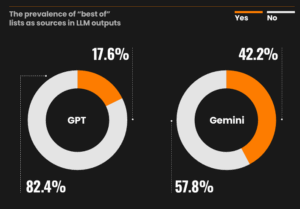
42% of results using ‘best of’ lists is pretty huge. This is not just earned media but a very specific type of earned media that is being used as a source. Essentially listicles and specifically best ‘insert term’ listicles.
However, in ChatGPT, ‘best of’ lists were only used 17.5% of the time as a source. Would we think this is pretty high still if the Gemini results weren’t so surprising? Possibly.
This wasn’t something we were expecting, but it is something we have been adding to our arsenal as an agency.
Example below
For Protein Works we worked to get them into a few highly relevant publications that were compiling ‘best of 2025’ lists
We placed them in Men’s Health. Not only did they earn coverage in the list, they were listed in top place (Having a great product is important, who knew?)
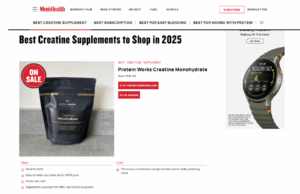
Just this type of coverage drove a 320% increase in traffic to the page from affiliates and a 386% uplift in revenue.
On top of that, brand + product searches are up 78% month on month. More people are searching for the brand in relation to that product.
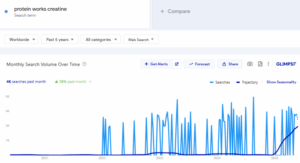
What does this PR approach mean for earned media and LLMs?
Well, here is that same article appearing in a Gemini search as a source for ‘Best creatine supplements’

This type of PR looks like it’s going to be a key part of showing up in LLMs, in particular on Gemini, seemingly less so on ChatGPT.
Build or develop a truly great product, and get it in the right hands at the right relevant publication. This isn’t about what type of link we are getting here and whether it’s affiliate or not; this is a thumbs up to LLMs and customers that you are credible. Just like it always was.
NATIONAL MEDIA WAS ONLY USED AS A SOURCE 6% OF THE TIME IN CHATGPT AND 30% OF THE TIME IN GEMINI
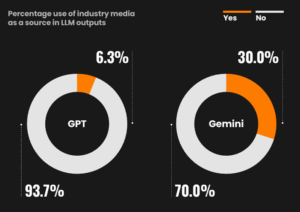
Interesting right? And of that percentage, there was a similar list of publications.
The Guardian, New York Times, Forbes.
What does this mean? It means you should only target these publications from now on… joking, do not do that.
Our assumption here is that because the non-branded search queries were related to specific industries, it would make sense for LLMs to draw on information that is most relevant to that query. Those types of sites publish in volume around those topics, and whilst national media have sections of their sites dedicated to specific topics, overall they don’t have the relevance that an industry-specific publication has.
ChatGPT has also been trained on a dataset from specific publications which OpenAI has formed partnerships with. The waters are muddy as the national media are the ones that are going to be protecting themselves most when it comes to data sharing.
So what we could be looking at here is just the fact that AI companies and national media haven’t fully figured out a relationship that is fruitful for both parties. Hence the figures being surprisingly on the low side.
Still very interesting for where we are at right now.
ONE MORE SEMI-INTERESTING STAT: REDDIT WAS USED AS A SOURCE 7% OF THE TIME IN GEMINI
HOW RECENTLY PUBLISHED WERE THE SOURCES THAT WERE USED?
Finding out how recent the sources stated would give us vital information on if recency bias was a thing when using earned media as a source in LLMs? And therefore, how important up-to-date PR activity is in being constantly visible in LLMs.
We’re in the early days here. Gemini’s training was mostly carried out in 2023 and ChatGPT in 2021 but with a rumoured last update in 2023 but with access to up-to-date information.
The platforms also differ in how they gather information. Gemini is integrated with Google’s ecosystem, including Google search, which allows it more up-to-date information sources compared to certain versions of ChatGPT
Here’s what we found:
ChatGPT
- 60% of sources were from 2023
- 31% of sources were from 2024
- 9% of sources were from 2025
Gemini
- 51% of sources were from 2023
- 34% of sources were from 2024
- 15% of sources were from 2025
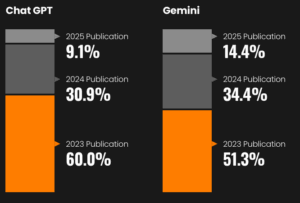
You can lean here towards the fact that 40% of sources were from 2024 onwards in GPT, and nearly 50% of sources in Gemini were from 2024 onwards.
Recency of PR coverage is something that is going to become more and more important when it comes to being visible in LLMs. The above percentages for 2024 and 2025 are actually quite high when you consider we are only halfway through 2025 and that we are still in the fairly early days of LLMs.
What does it mean?
This is super interesting. As LLMs move past their initial base set of data that they were trained on and as more and more partnerships are formed with media and publishers, recency of coverage for your brand will 100% become important as LLMs scour for recent proof that your brand is correlated with a topic and has a thumbs up from relevant media.
PR will need to be ongoing to maintain visibility in LLMs, much like it is in Google right now. The frequency of brand mentions in relevant publications looks like it will be a big focus in AI SEO and when it comes to showing up in LLMs for non-branded search queries.


